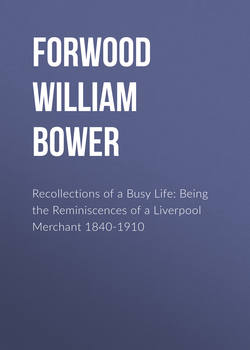Читать книгу Recollections of a Busy Life: Being the Reminiscences of a Liverpool Merchant 1840-1910 - Forwood William Bower - Страница 11
CHAPTER III.
LIVERPOOL
The American War
ОглавлениеThe great war between the Northern and Southern States of America, which was waged from 1861 to 1865, had a far-reaching influence upon Liverpool.
Prior to this date American shipping filled our docks, and 82 per cent. of our cotton imports were derived from the Southern States.
The election of Lincoln as President of the United States, and the rejection of the democratic candidate precipitated a crisis which had been long pending.
Slavery was a southern institution, and although it was conducted in the most humane manner, and many of the worst features of the system were absent, the principle of slavery was abhorrent to a large section of the northern people, and the south feared that with the election of Lincoln this section would become all-powerful. South Carolina was the first state to assert her sovereign right to secede from the union. Other states followed slowly and with hesitating steps, and by the end of 1861 the north and south were engaged in mortal combat. The southern states were ill equipped for the struggle, they had no war material and were dependent for clothing and many of the necessities of life upon the northern manufacturers.
The policy of the north was, therefore, to establish a blockade of the south, both by land and by sea, which caused prices of many commodities to rapidly advance in the south, and cotton, their main export, to quickly decline in value.
The English people sympathised with the south, as the weaker power, and also having been actively associated with them in trade. The arrest of the southern envoys Mason and Slidell upon the British mail steamer "Trent," by the federal commander, did not improve the relationship between Great Britain and the Government at Washington, and created ill feeling against the north.
Under these circumstances Liverpool merchants fitted out many costly expeditions to run the blockade and to carry arms and munitions of war into the southern ports. The modus operandi was to send out a depot ship to Nassau or Bermuda and employ in connection with this swift steamers to run the blockade and bring back cargoes of cotton. The profits of the trade were great, but the risk was also very considerable.
The trade at best was a very questionable one; it was justified on the ground that a blockade cannot be recognised unless effectual. The United States started with a blockading fleet of 150 vessels, but at the end of the war they had 750 vessels employed in this service. The blockade runner had to rely entirely upon her speed, as to fire a gun in her own defence would at once have constituted her a piratical vessel. The fastest steamers were bought and built for the purpose. They usually made the American coast many miles from the port and then under the cover of darkness they stole along the shore until they came to the blockading fleet, when they made a dash for the harbour. It was exciting work, and appealed to many adventurous spirits, and the prize if successful was great. I think all this had a demoralising influence upon Liverpool's commercial life, and the intense spirit of speculation created by the cotton famine was also very injurious. Fortunes were made and lost in a single day. Prices of cotton, while peace and war hung in the balance, fluctuated violently, and when war was seen to be inevitable, they advanced with fearful rapidity. A shilling per lb. was soon reached. The mills went upon short time. By the summer of 1862 cotton was quoted at 2s 6d per lb. The speculative fever became universal; men made fortunes by a single deal. When the recoil came after the war most of these fortunes were lost again. Legitimate trade had been sacrificed to speculation. Mansions luxuriously furnished, picture galleries, horses, and carriages had to be sold, and in not a few instances, their owners, having lost both their legitimate business and their habits of industry, were reduced to penury and want, and were never able to recover themselves. The results of the war were far-reaching. The spirit of speculation was rampant for many years, with disastrous results; it was only when a system of weekly and bi-weekly settlements was introduced that speculation was brought within legitimate limits.
A Nemesis seemed to follow this violent outburst of speculation, and but few houses actively engaged in it survived very long.
Liverpool was also active in assisting the south to build and fit out vessels of war to prey upon American commerce. The "Alabama" was built at Birkenhead; she sailed away to a remote island and there took on board her armament. She and her sister ship, the "Shenandoah," did immense damage to American shipping, for which England had in the end to pay, as by the Geneva arbitration she was held responsible for allowing the "Alabama" to be built and escape.
American shipping has never recovered from this blow, but it is only fair to say that the cost of shipbuilding in America, by reason of her prohibitive tariffs, has mainly prevented her resuming her former position on the ocean.
